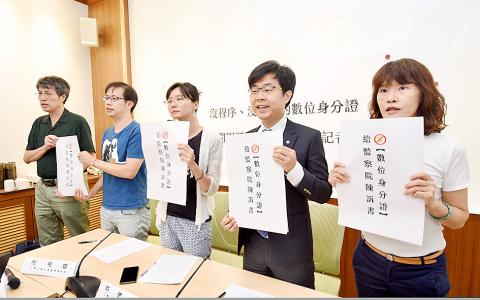The Taiwan Association for Human Rights (TAHR) and the Judicial Reform Foundation (JRF) yesterday called on the Control Yuan to investigate a government plan to start issuing national electronic identification cards (eID) next year, saying they constitute invasion of privacy.
The Ministry of the Interior had pushed the eID scheme without any legal basis or assessing its impact on personal privacy, and keeping the public in the dark about the NT$3.3 billion (US$105.7 million) tender for the project, association secretary-general Chiu E-ling (邱伊翎) said.
The eID would become a tool for the government to track all aspects of people’s daily lives, spurring tighter control and pervasive monitoring of society, and undermining national security if eID data are hacked or leaked, Chiu said.

Photo: Peter Lo, Taipei Times
The ministry expects to start issuing the new ID, which has an embedded electronic chip for storing digital personal information, in October next year.
The government did not hold a public hearing to discuss and monitor the program, Chiu said, adding that officials in charge had worked to cover up many questionable and contentious aspects of the scheme.
“The Constitution upholds the right to personal privacy and against unauthorized collection of personal data,” foundation executive and attorney Lin Yu-teng (林煜騰) said. “However, the government is working to gather all personal information and embed it in a chip on a card.”
“This card will be the ‘Trojan horse’ that intrudes on every citizen’s private data. It would be disastrous to national security and impede people’s right to protection and ownership of their personal data,” he said.
The Council of Grand Justices’ Interpretation No. 603 states that the right to privacy is an indispensable fundamental right and is protected by Article 22 of the Constitution, ensuring protection of the right to private information and preventing a person’s intimate life from being infringed upon by others, Lin said.
As the ministry has disregarded people’s rights under the Constitution, the foundation will launch a lawsuit to defend people’s right to privacy and offer legal assistance to those who refuse the new IDs.
While the Household Registration Act (戶籍法) states that ID cards are a requirement for citizens, “it does not say that an embedded electronic chip on an ID is needed, hence, there is no legal basis for such a scheme,” Chiu said.
The ministry yesterday released a statement saying that the new digital card has a legal framework for protection of personal information and strict conditions are in place to limit data use.
Compared with the paper version, it “will offer even better protection of personal information and uphold the right of self-determination of information,” it said.
“The new eID will have the same functions as the current ID for identifying an individual and will contain even less information. It will have a more advanced anti-counterfeiting feature and the electronic chip data will have the added protection of needing a password to access information,” it said.

The manufacture of the remaining 28 M1A2T Abrams tanks Taiwan purchased from the US has recently been completed, and they are expected to be delivered within the next one to two months, a source said yesterday. The Ministry of National Defense is arranging cargo ships to transport the tanks to Taiwan as soon as possible, said the source, who is familiar with the matter. The estimated arrival time ranges from late this month to early next month, the source said. The 28 Abrams tanks make up the third and final batch of a total of 108 tanks, valued at about NT$40.5 billion

Two Taiwanese prosecutors were questioned by Chinese security personnel at their hotel during a trip to China’s Henan Province this month, the Mainland Affairs Council (MAC) said yesterday. The officers had personal information on the prosecutors, including “when they were assigned to their posts, their work locations and job titles,” MAC Deputy Minister and spokesman Liang Wen-chieh (梁文傑) said. On top of asking about their agencies and positions, the officers also questioned the prosecutors about the Cross-Strait Joint Crime-Fighting and Judicial Mutual Assistance Agreement, a pact that serves as the framework for Taiwan-China cooperation on combating crime and providing judicial assistance, Liang

A group from the Taiwanese Designers in Australia association yesterday represented Taiwan at the Midsumma Pride March in Melbourne. The march, held in the St. Kilda suburb, is the city’s largest LGBTQIA+ parade and the flagship event of the annual Midsumma Festival. It attracted more than 45,000 spectators who supported the 400 groups and 10,000 marchers that participated this year, the association said. Taiwanese Designers said they organized a team to march for Taiwan this year, joining politicians, government agencies, professionals and community organizations in showing support for LGBTQIA+ people and diverse communities. As the first country in Asia to legalize same-sex

MOTIVES QUESTIONED The PLA considers Xi’s policies toward Taiwan to be driven by personal considerations rather than military assessment, the Epoch Times reports Chinese President Xi Jinping’s (習近平) latest purge of the Chinese People’s Liberation Army (PLA) leadership might have been prompted by the military’s opposition to plans of invading Taiwan, the Epoch Times said. The Chinese military opposes waging war against Taiwan by a large consensus, putting it at odds with Xi’s vision, the Falun Gong-affiliated daily said in a report on Thursday, citing anonymous sources with insight into the PLA’s inner workings. The opposition is not the opinion of a few generals, but a widely shared view among the PLA cadre, the Epoch Times cited them as saying. “Chinese forces know full well that